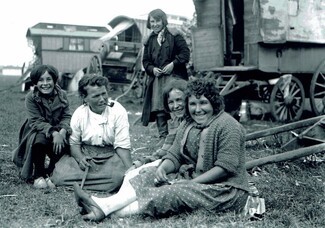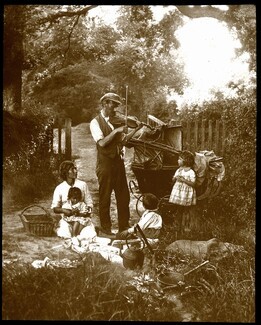Human rights group Aye Right release new film
A new film, funded by Lankelly Chase, made for the human rights advocacy group in Scotland, ‘Aye Right’, for the This Land project has just been released to create greater awareness and understanding of nomadic communities cultural and traditional practices.
“When they tell you Gypsies and Travellers are an environmental problem, please show them this film,” says community activist and filmmaker Jake Bowers, “The film uses archive photographs, cinematic imagery and a poem to explore the long and well established connection between Gypsies and Travellers and the landscapes we have always travelled through and worked in."
Using archive imagery from the Robert Dawson Gallery collections, Gypsy and Traveller family photograph albums, Kushti Bok, Bourne Hall Museum and independent film makers, the film is a powerful exploration of the deep connection to the land. It is read by Jake and fellow community activist Lynne Tammi.
“The key aim of the This Land project is to create a greater awareness and understanding of community cultural and traditional practices, by people in/from Gypsy, Roma, or Traveller communities,” Lynne told Travellers Times, “In particular, the project focuses on the relationship nomadic communities have with the land, how that use of the land is shared across and between families and communities and how the denial of access to traditional stopping places and routes impact on the communities’ right to practice their traditions and culture. To achieve this, I have reached out to our artists, musicians, smiths, basket makers [my craft], storytellers, poets, writers and dreamers from Gypsy, Roma, Traveller and other nomadic groups in the UK to identify and record how our work is driven by our connection to the land.”

The next steps are to bring together key law and policy makers and elected representatives to discuss the content and context of the videos and to encourage them to work in collaboration and to challenge and address the persistent negative social representations directed towards Gypsy, Roma, Traveller and other nomadic communities.
The film is released as Drive 2 Survive is continuing its research project with Sussex University to examine how the narrative of Gypsies and Travellers as being inherently "dirty" is constantly reinforced by the media. It is hoped that by contrasting the community's own view of cleanliness and purity with mainstream media narratives that campaigners can begin to challenge the widespread notion that characterises Gypsy, Roma and Traveller communities as an environmental problem.

You can read the words of the poem below
This Land
Let me piece together our story, from the shreds that are now left
For most it is invisible, long bleached out from the weft
Yet in our nation’s fabric we’ve been there all along
But for us it’s not so easy to answer: “where is it I am from?”
For you it may be a town, a house, a street, a place
But for us it may be a direction, that we emerged out of in haste
From the North came the summer walkers and the Nacken, who some say are descendants of the clans
From the west, the Pavee tinsmiths, hawking pots and pans
From the south and east came the Romani, from India long ago
Together they met at the margins, and together they did grow
From above came divine inspiration to walk lightly on the land
But below is where we’re really from, our home is where we stand
From the Daffodils down in Cornwall that we picked in fragile spring
To the Berry fields of Blair, where the Stewarts used to sing
Faces down, backs tired with picking, it was all the crops we knew
The taters, the beet, the yeasty hops. We harvested everything that grew
And then there were the blacksmiths,
who gave ore it’s useful form
They beat it into horseshoes and ploughshares,
To work the earth where they were born
Some raised horses, ponies and mules, richly fed them on the hoof
Equine and human wanderers lived in symmetry, with just a sky as roof
We knew each twitch of the flank and ear, each dramatic stamp and nicker
We were horse whisperers from birth, they were fast, but we were quicker
At every fair and market, we sold this valued, healthy stock
To keep each farm producing food upon this north Atlantic rock
And when it came to defend this land, we packed our bags and went
Used to living on enemy territory, it was no hardship in a tent
Each and every family had men who never made it home
No breadwinner left to fill the pots of those who had to roam
Yet they moved on, as others did, beyond what they had seen
And found this land ‘fit for heroes’ began to grow quite mean
At first they closed the commons, the bye ways and the drove
And took away our stopping places where our ancestors would rove
Reduced to living on wasteland, before the council man appeared
Modernity brought misery and everything we feared.
They stole our children far away from us to settle other nomadic lands
Our woman tried to get them back, but they were deaf to all demands
The plan was to cut the links that bind us deeply to one another
To ‘educate’ away our connection, to the earth, the land, our mother
It worked, in part, because those we knew, grew cold and hard and mean
Unlike their ancestors they turned away from everything that’s green
But our elders knew better, they said this too shall pass
They taught us all we had was each other. So those who listened held fast.
So when you see a Gypsy boy or Traveller girl with horses at the fair
Or caravans still pitching up on open land without a care
You’re witnessing a triumph from a people with a past
With an iron determination to prosper, to overcome and last
Each one of us came from everywhere, we sprung from this very land
And to her we shall return, in turn, when we’ve made our earthly stand
Article by TT News